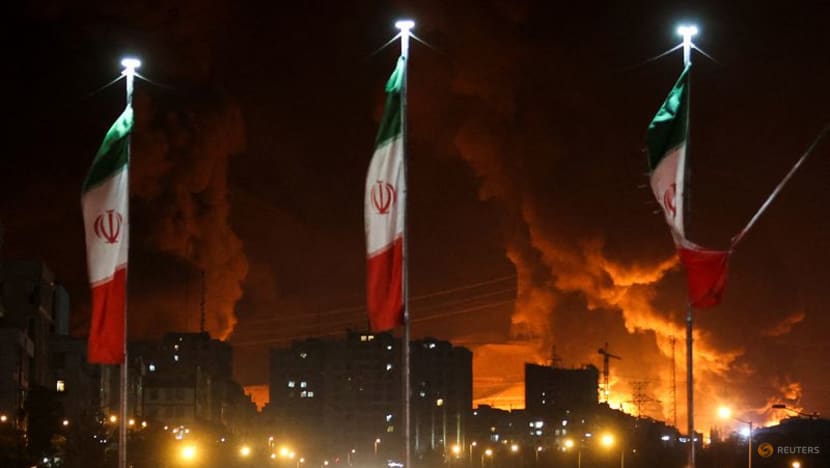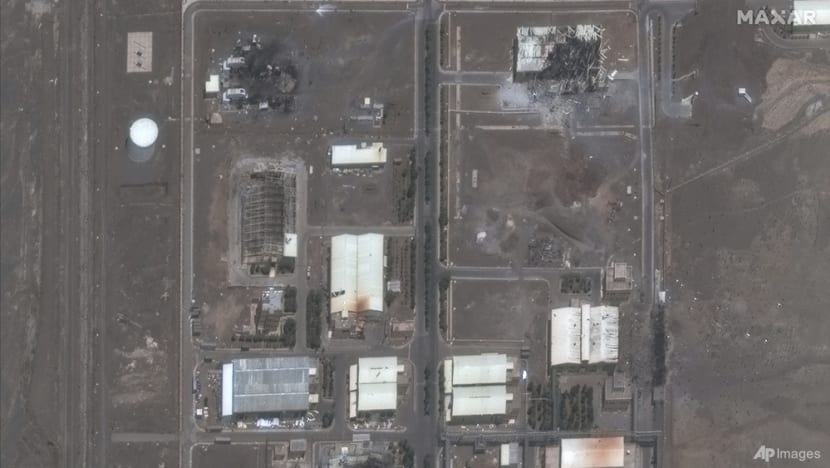Commentary: North Korea will never denuclearise, after Israel strikes on Iran
Anti-Western states will learn the same lesson from Israel’s attacks on Iran - nuke up and never, ever give them up, says Pusan National University’s Robert Kelly.


This audio is generated by an AI tool.
BUSAN, South Korea: Israel launched an unprecedented attack on military and nuclear targets across Iran on Friday (Jun 13), keeping up strikes over the weekend as it seeks to stop Tehran’s halting nuclearisation effort.
But the strikes tell every power considering nuclear weapons something else - to build them as rapidly as possible and in secret.
Israeli Prime Minister Benjamin Netanyahu justified the attack as a preemptive strike – implying that Iran was on the cusp of attacking Israel. But it should be better understood as preventive, a first strike far in advance of a problem which ostensibly looms as an existential threat.
There is little evidence that Iran was about to strike, nor that Iran currently has a nuclear weapon. Importantly, if it did, Israel almost certainly would not have used force.
For anti-Western rogue states, particularly, the lesson of this weekend is the same as that of Saddam Hussein and Muammar Gaddafi’s downfall: If you have nuclear weapons, you will not be attacked. The best defence against American or Western action is to nuke up and never denuclearise, no matter what they offer.
IRAN WILL ABSOLUTELY GO NUCLEAR NOW
Now, there is no reason for Iran to desist from nuclearisation.
Mr Netanyahu’s claims aside, Iran was not hellbent on building a nuclear bomb. In 2015, Iran struck a deal that limited its nuclear programme – in particular, limits on enrichment that would block its ability to build a nuclear weapon – in exchange for sanctions relief.
Known as the Joint Comprehensive Plan of Action (JCPOA), the deal was negotiated with the United States under former President Barack Obama, along with the United Kingdom, China, France, Germany, the European Union and Russia.
The deal did not completely denuclearise Iran, and it was always possible that the nuclear infrastructure left in the country could have been weaponised. But a nuclear weaponisation drive almost certainly would have been detected – as a similar one was in North Korea in the 1990s. And Iran made it easy to detect such actions by agreeing to site inspections by the International Atomic Energy Agency.
Nevertheless, US President Donald Trump pulled the US out of JCPOA in his first term. The deal collapsed, and his successor Joe Biden was unable to put it together again. More broadly, hawks in the US and Israel long opposed any deal which left Iran with any nuclear capacity and pushed the debate toward strikes.
This past weekend was the culmination of that effort. Israel, and the US by extension, are now committed to military denuclearisation indefinitely.
After the Israel strikes, Mr Trump continued to urge Iran to “make a deal before it is too late”. Iran will almost certainly never negotiate something like the JCPOA again. Even if Tehran did, trust among the parties would likely be so low that any new deal would fall apart.
And Iran now has an obvious, huge incentive to nuke up as fast as possible.
From Iran’s perspective, the US reneged on the deal negotiated in good faith and now let its ally bomb the country. So now it will probably sprint for nuclear weapons as North Korea did in the 1990s and 2000s.
Israel’s latest strikes have killed nine nuclear scientists and damaged some above-ground sites, but it will be much harder to eliminate Iran’s collective expertise and destroy facilities deep underground.
So now, the only way to keep Iran from getting one will be to bomb it whenever it gets close – again and again.

NORTH KOREA WILL NEVER DENUCLEARISE
Other anti-Western states will learn the same lesson. And for those who already have nuclear weapons – North Korea and, less so, Pakistan – the lesson is to never, ever give them up.
Its doctrine calls for the use of nuclear weapons at fairly low thresholds of conflict, and it is a serial proliferator. The US and its partners have demanded for 30 years that Pyongyang completely denuclearise.
To be sure, complete denuclearisation of North Korea has always been very unlikely.
Nuclear weapons are a great point of pride for the North Korean ruling family. They can be used on the battlefield to equalise the fight against a vastly superior South Korea. And they serve to threaten the US with massive retaliation should the US ever use force in the peninsula.
But there has long been hope that some mix of concessions – such as sanctions relief or aid – might convince the North Korea to at least cap its warhead totals, permit inspectors and otherwise engage in arms control. This would probably not eliminate the Northern programme completely, but it might keep it at its currently low stockpile total (30 to 50 warheads is the usual estimate).
Israel’s attacks will be a sharp demonstration why Pyongyang should not do this.
North Korea’s nukes are the shield which protects it from exactly this sort of airstrike and other, perhaps harsher, military action. Again and again, this nuclear escalation fear has constrained the US, South Korea and Japan from striking, even after provocation.
In 2010, Seoul wanted to respond to a deadly sinking of a navy ship in the Yellow Sea and a separate artillery attack on a South Korean island that resulted in civilian deaths. In 2022, Japan wanted to respond to North Korea conducting a long-range missile test over its islands.
In each case, there was little to no response, likely for fear of nuclear escalation.
THE BEST DETERRENT
Israel’s airstrikes will likely work in the short term to set back Iran’s nuclear programme but in the medium term they will only worsen the nuclear threat everywhere.
The strikes will encourage illiberal, anti-democratic states everywhere to consider a nuclear deterrent as the best means to safeguard their security.
Iran negotiated in good faith and was met by hawkish ideology and airstrikes; North Korea did not negotiate, raced for nuclear weapons no matter the costs, and never faces retaliation.
Rogues everywhere – including Iran itself – will see the wisdom of the North Korean strategy more clearly after this.
Robert Kelly (@Robert_E_Kelly) is a professor of political science at Pusan National University. He writes a monthly column for CNA, published every second Monday.



















